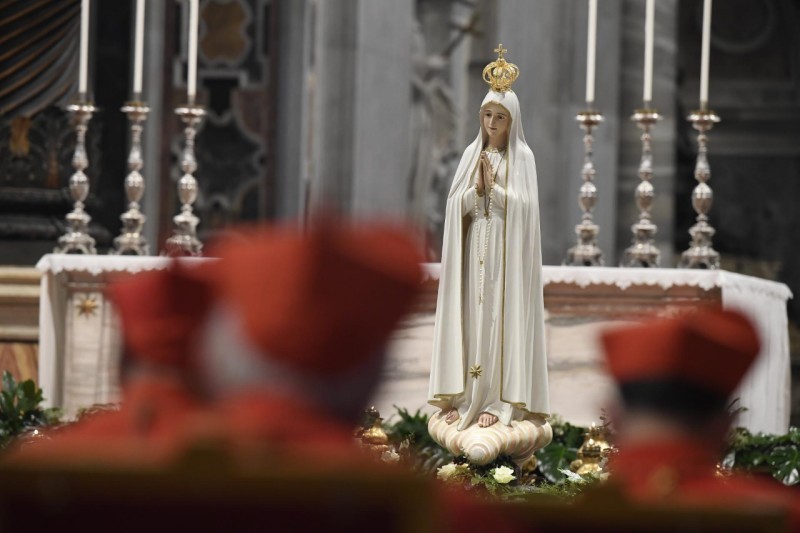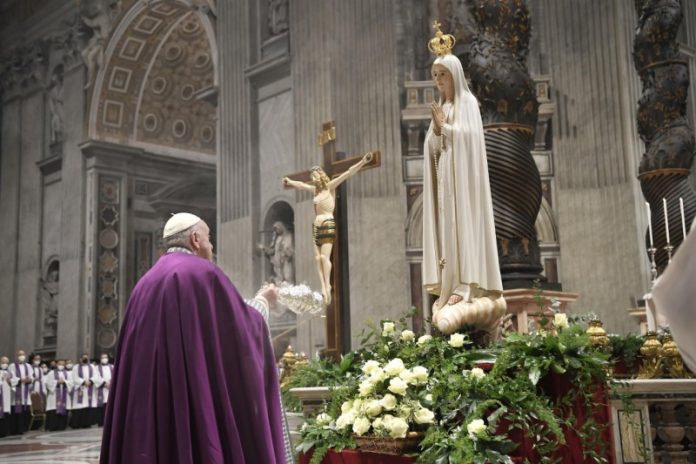Pope Francis on Friday consecrated Russia and Ukraine to the Immaculate Heart of Mary with a prayer asking for peace in the world.
At the end of a penitential service in St. Peter’s Basilica on March 25, the pope carried out the act, saying: “Mother of God and our Mother, to your Immaculate Heart we solemnly entrust and consecrate ourselves, the Church and all humanity, especially Russia and Ukraine.”
“Accept this act that we carry out with confidence and love. Grant that war may end and peace spread throughout the world,” he prayed, on the same day that the Church celebrated the Solemnity of the Annunciation of the Lord.
Seated before a statue of Our Lady of Fatima from a shrine in central Italy, Pope Francis said: “The people of Ukraine and Russia, who venerate you with great love, now turn to you, even as your heart beats with compassion for them and for all those peoples decimated by war, hunger, injustice, and poverty.”
“Through your intercession, may God’s mercy be poured out on the earth and the gentle rhythm of peace return to mark our days.”
The act of consecration was also read simultaneously by Cardinal Konrad Krajewski, the papal almoner, at the Sanctuary of Our Lady of Fatima in Portugal.
The act of consecration took place at the end of the Vatican’s annual Lenten penance service, during which Pope Francis and other priests heard the confessions of Catholics present in St. Peter’s Basilica.
In his homily, the pope said that the consecration “is no magic formula but a spiritual act.”
“It is an act of complete trust on the part of children who, amid the tribulation of this cruel and senseless war that threatens our world, turn to their Mother, reposing all their fears and pain in her heart and abandoning themselves to her,” he said.
“It means placing in that pure and undefiled heart, where God is mirrored, the inestimable goods of fraternity and peace, all that we have and are, so that she, the Mother whom the Lord has given us, may protect us and watch over us.”
During the liturgy, Francis said: “In these days, news reports and scenes of death continue to enter our homes, even as bombs are destroying the homes of many of our defenseless Ukrainian brothers and sisters. The vicious war that has overtaken so many people, and caused suffering to all, has made each of us fearful and anxious.”
“We sense our helplessness and our inadequacy. We need to be told, ‘Do not be afraid,’” he said. “Yet human reassurance is not enough. We need the closeness of God and the certainty of his forgiveness, which alone eliminates evil, disarms resentment, and restores peace to our hearts. Let us return to God and to his forgiveness.”
At the start of the service, Pope Francis stopped before a large crucifix placed in the center of the basilica’s nave, over the tomb of St. Peter.
The live-streamed liturgy, which was punctuated by periods of silence, began with the chanting of the Latin hymn “Attende, Domine,” which means “Hear us, O Lord.”
“Brothers and sisters,” Pope Francis said, “God calls us once again to conversion: let us pray to obtain the grace of a new life in Christ our Lord.”

The first reading was from the Letter of St. Paul to the Colossians. “He delivered us from the power of darkness and transferred us to the kingdom of his beloved Son, in whom we have redemption, the forgiveness of sins,” the lector read.
The responsorial psalm, taken from Psalm 97, was “the Lord has made known his salvation.”
The day’s Gospel, Luke 1:26-38, was the story of the Annunciation, when the Angel Gabriel appeared to the Virgin Mary and announced that she would conceive Jesus, the Son of God.
The Gospel was followed by a homily from Pope Francis, who said that the conflict in Ukraine cannot be ended by our own power alone, but requires God’s love.
“By ourselves, we cannot succeed in resolving the contradictions of history or even those of our own hearts. We need the wisdom and gentle power of God that is the Holy Spirit. We need the Spirit of love who dispels hatred, soothes bitterness, extinguishes greed, and rouses us from indifference,” the pope said. “We need God’s love, for our love is fragile and insufficient.”
“Indeed, without love, what can we offer to the world? It has been said that a Christian without love is like a needle that does not sew: it stings, it wounds, and if it fails to sew, weave or patch, then it is useless. This is why we need to find in God’s forgiveness the power of love: the same Spirit who descended upon Mary.”
Pope Francis said that if people want the world to change, it is their hearts that must change first.
“For this to happen, let us allow Our Lady to take us by the hand. Let us gaze upon her Immaculate Heart in which God dwelt, ‘our tainted nature’s solitary boast.’”
“God changed history by knocking at the door of Mary’s heart,” he said. “Today, renewed by God’s forgiveness, may we too knock at the door of her immaculate heart. In union with the bishops and faithful of the world, I desire in a solemn way to bring all that we are presently experiencing to the Immaculate Heart of Mary.”
“I wish to renew to her the consecration of the Church and the whole of humanity, and to consecrate to her in a particular way the Ukrainian people and the Russian people who, with filial affection, venerate her as a Mother.”
Pope Francis also urged Catholics to not be afraid to approach God in the Sacrament of Reconciliation.
“If your sins frighten you, if your past worries you, if your wounds do not heal, if your constant failings dishearten you and you seem to have lost hope, do not be afraid,” he said. “God knows your weaknesses and is greater than your mistakes. He asks of you only one thing: that you not hold your frailties and sufferings inside. Bring them to him, lay them before him and, from being reasons for despair, they will become opportunities for resurrection.”
After the homily, the pope led a period of silence to make an examination of conscience.
Then there was a general confession of sins, where the assembly and Pope Francis together prayed the Confiteor, followed by the chanting of “Kyrie, eleison,” which is Greek for “Lord, have mercy.”
After the Our Father prayer, individuals could receive the Sacrament of Reconciliation, also called confession, from priests present throughout the basilica.
Continuing his custom started in 2014, Pope Francis first went to confession himself, before then hearing the confessions of others.
During the confessions, periods of silence were alternated with Lenten chants.
After giving the final blessing, Pope Francis sat before a statue of Our Lady from the Shrine of Our Lady of Fatima in San Vittorino, Italy, and entrusted and consecrated Russia and Ukraine to the Immaculate Heart of Mary through a prayer for peace.
The celebration ended with the presentation of white flowers and the singing of a song of thanksgiving to the Immaculate Virgin Mary.









